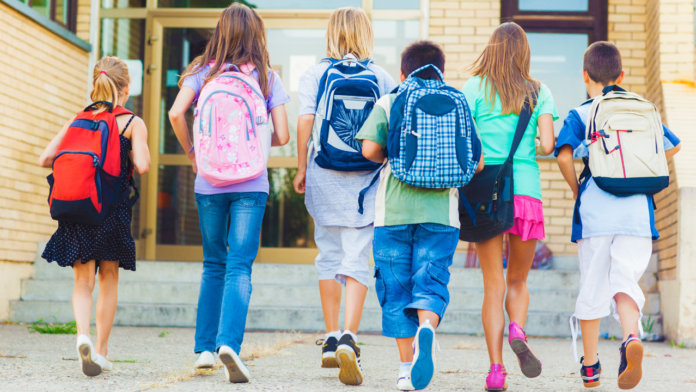What is the best way to assess the quality of education? The RAEX rating agency has decided to approach this issue from a practical point of view.
The company's experts have compiled a list of the 100 best schools in Russia in 2020, whose students have the greatest chances of enrolling in 48 of the country's most famous universities.
| A place | School | Region | City | Score |
|---|---|---|---|---|
| 1 | SSC MSU | Moscow | Moscow | 100.00 |
| 2 | Lyceum "Second School" | Moscow | Moscow | 90.68 |
| 3 | Physics and Mathematics Lyceum No. 31 of Chelyabinsk | Chelyabinsk region | Chelyabinsk | 89.31 |
| 4 | University gymnasium of Moscow State University named after M.V. Lomonosov | Moscow | Moscow | 86.06 |
| 5 | Republican Lyceum for Gifted Children | Mordovia Republic | Saransk | 83.76 |
| 6 | Presidential Physics and Mathematics Lyceum №239 | St. Petersburg | St. Petersburg | 82.84 |
| 7 | Phystech Lyceum. P.L. Kapitsa | Moscow region | Dolgoprudny | 81.94 |
| 8 | School number 2007 FMS | Moscow | Moscow | 80.00 |
| 9 | Vologda multidisciplinary lyceum | Vologda Region | Vologda | 77.27 |
| 10 | Moscow School in the South-West No. 1543 | Moscow | Moscow | 76.26 |
| 11 | Academic Lyceum "Physics and Technology School" | St. Petersburg | St. Petersburg | 75.05 |
| 12 | School number 179 | Moscow | Moscow | 74.72 |
| 13 | SSC NSU | Novosibirsk region | Novosibirsk | 72.00 |
| 14 | Lyceum of scientific and engineering profile | Moscow region | Korolev | 70.03 |
| 15 | Ugra Physics and Mathematics Boarding School | KhMAO - Ugra | Khanty-Mansiysk | 69.52 |
| 16 | St. Petersburg Governor's Physics and Mathematics Lyceum No. 30 | St. Petersburg | St. Petersburg | 67.99 |
| 17 | School "Intellectual" | Moscow | Moscow | 67.87 |
| 18 | Lyceum at TPU | Tomsk region | Tomsk | 67.84 |
| 19 | Lyceum of classical elite education | Rostov region | Rostov-on-Don | 67.04 |
| 20 | Pre-university MEPhI | Moscow | Moscow | 66.87 |
| 21 | Physics and Mathematics Lyceum № 5 Dolgoprudny | Moscow region | Dolgoprudny | 65.87 |
| 22 | School number 1589 | Moscow | Moscow | 65.38 |
| 23 | School number 1535 | Moscow | Moscow | 64.73 |
| 24 | Bauman Engineering School number 1580 | Moscow | Moscow | 64.10 |
| 25 | Fifty-seventh school | Moscow | Moscow | 63.99 |
| 26 | Sergiev Posad Physics and Mathematics Lyceum | Moscow region | Sergiev Posad | 59.26 |
| 27 | HSE Lyceum | Moscow | Moscow | 59.12 |
| 28 | Academic Gymnasium named after D.K.Faddeev SPbSU | St. Petersburg | St. Petersburg | 58.78 |
| 29 | Natural Science Lyceum of SPbPU | St. Petersburg | St. Petersburg | 58.53 |
| 30 | Lyceum No. 366 "Physics and Mathematics Lyceum" | St. Petersburg | St. Petersburg | 58.01 |
| 31 | SUNC UrFU | Sverdlovsk region | Ekaterinburg | 57.68 |
| 32 | School number 1533 "LIT" | Moscow | Moscow | 57.06 |
| 33 | School number 67 | Moscow | Moscow | 56.96 |
| 34 | Elista Lyceum | Kalmykia Republic | Elista | 56.73 |
| 35 | Kirov Physics and Mathematics Lyceum | Kirov region | Kirov | 56.52 |
| 36 | Lyceum number 131 | Tatarstan republic | Kazan | 56.41 |
| 37 | Lyceum number 153 | Bashkortostan Republic | Ufa | 55.57 |
| 38 | School number 1568 named after Pablo Neruda | Moscow | Moscow | 52.87 |
| 39 | School number 1518 | Moscow | Moscow | 52.73 |
| 40 | Tomsk Physics and Technology Lyceum | Tomsk region | Tomsk | 51.67 |
| 41 | Lyceum MGIMO them. A.M. Gorchakova | Moscow region | Odintsovo | 50.25 |
| 42 | Shuvalov school number 1448 | Moscow | Moscow | 50.04 |
| 43 | Lyceum number 3 (Cheboksary) | Chuvashia republic | Cheboksary | 49.63 |
| 44 | CHOU SOSH "Lomonosov School" | Moscow | Moscow | 49.62 |
| 45 | Lyceum № 130 named after Academician M.A. Lavrentieva | Novosibirsk region | Novosibirsk | 49.60 |
| 46 | Lyceum of the Presidential Academy of the RANEPA | Moscow | Moscow | 48.85 |
| 47 | Engineering school number 1581 | Moscow | Moscow | 48.76 |
| 48 | Lyceum number 41 | Udmurtia republic | Izhevsk | 48.74 |
| 49 | Economics and Mathematics Lyceum № 29 | Udmurtia Republic | Izhevsk | 48.52 |
| 50 | Gymnasium number 9 | Sverdlovsk region | Ekaterinburg | 48.20 |
| 51 | St. Petersburg classical gymnasium number 610 | St. Petersburg | St. Petersburg | 47.89 |
| 52 | School number 6 (Mytishchi) | Moscow region | Mytishchi | 47.77 |
| 53 | IT Lyceum KFU | Tatarstan republic | Kazan | 47.53 |
| 54 | Lyceum named after N.I. Lobachevsky KFU | Tatarstan republic | Kazan | 47.20 |
| 55 | School number 146 with in-depth study of mathematics, physics, computer science | Perm region | Permian | 47.08 |
| 56 | School number 1514 | Moscow | Moscow | 46.83 |
| 57 | Lyceum number 39 | Chelyabinsk region | Ozersk | 46.66 |
| 58 | School number 1306 - "School of young politicians" | Moscow | Moscow | 46.23 |
| 59 | Anichkov Lyceum (Youth Creativity Palace) | St. Petersburg | St. Petersburg | 46.09 |
| 60 | School number 1329 | Moscow | Moscow | 45.67 |
| 61 | Academic school number 1534 | Moscow | Moscow | 45.57 |
| 62 | Secondary school number 33 named after K. Marx with in-depth study of mathematics | Yaroslavskaya oblast | Yaroslavl | 45.54 |
| 63 | Lyceum number 19 (Korolev) | Moscow region | Korolev | 45.41 |
| 64 | School number 2086 | Moscow | Moscow | 45.19 |
| 65 | Lyceum number 40 | Nizhny Novgorod Region | Nizhny Novgorod | 45.00 |
| 66 | School number 1502 "Energy" | Moscow | Moscow | 44.74 |
| 67 | Economic Lyceum of the PRUE G.V. Plekhanov | Moscow | Moscow | 44.70 |
| 68 | Samara Lyceum of Information Technologies | Samara Region | Samara | 44.66 |
| 69 | School number 1440 | Moscow | Moscow | 44.09 |
| 70 | CHOU SOSH "Personality" | Krasnodar region | Novorossiysk | 44.06 |
| 71 | Gymnasium of the city of Yurga | Kemerovo region | Yurga | 43.80 |
| 72 | School number 1253 | Moscow | Moscow | 43.71 |
| 73 | Gazprom school | Moscow | Moscow | 43.58 |
| 74 | School number 1520 named after Kaptsov | Moscow | Moscow | 43.20 |
| 75 | Lyceum number 97 in Chelyabinsk | Chelyabinsk region | Chelyabinsk | 43.11 |
| 76 | Lyceum boarding school number 2 | Tatarstan republic | Kazan | 43.04 |
| 77 | School number 1553 named after V.I. Vernadsky | Moscow | Moscow | 42.77 |
| 78 | School number 218 | Moscow | Moscow | 42.53 |
| 79 | Lyceum number 130 | Sverdlovsk region | Ekaterinburg | 42.43 |
| 80 | Pre-university MSLU | Moscow | Moscow | 42.35 |
| 81 | Republican boarding school | Sakha (Yakutia) Republic | Yakutsk | 42.30 |
| 82 | Regional boarding school for working with gifted children "School of Cosmonautics" | Krasnoyarsk region | Zheleznogorsk | 42.12 |
| 83 | School number 1317 | Moscow | Moscow | 41.70 |
| 84 | Lyceum No. 6 named after academician G.N. Flerova | Moscow region | Dubna | 41.68 |
| 85 | Urban Classical Lyceum | Kemerovo region | Kemerovo | 41.37 |
| 86 | School number 1498 "Moscow International School" | Moscow | Moscow | 41.32 |
| 87 | Lyceum of TSU | Tomsk region | Tomsk | 41.26 |
| 88 | NSTU Engineering Lyceum | Novosibirsk region | Novosibirsk | 41.17 |
| 89 | School number 1239 | Moscow | Moscow | 40.82 |
| 90 | Physicotechnical Lyceum named after V.P. Larionova | Sakha (Yakutia) Republic | Yakutsk | 40.67 |
| 91 | School number 1522 named after V.I. Churkina | Moscow | Moscow | 40.67 |
| 92 | Gymnasium number 3 in Akademgorodok | Novosibirsk region | Novosibirsk | 40.38 |
| 93 | School number 315 | Moscow | Moscow | 40.29 |
| 94 | Yakutsk City Lyceum | Sakha (Yakutia) Republic | Yakutsk | 40.15 |
| 95 | Lyceum number 2 (Almetyevsk) | Tatarstan republic | Almetyevsk | 40.09 |
| 96 | Physics and mathematics boarding school | Komi Republic | Syktyvkar | 39.96 |
| 97 | School number 171 | Moscow | Moscow | 39.65 |
| 98 | School number 2030 | Moscow | Moscow | 39.62 |
| 99 | Chelyabinsk Regional Multidisciplinary Boarding School for Gifted Children | Chelyabinsk region | Chelyabinsk | 39.50 |
| 100 | Gymnasium No. 116 (St. Petersburg) | St. Petersburg | St. Petersburg | 39.17 |
Here is the rating of Russian schools in 2020, which are in the top ten of RAEX.
10. Moscow School in the South-West No. 1543, Moscow
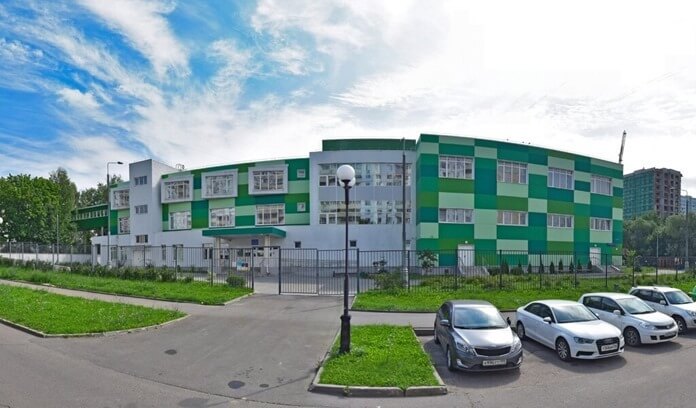 From the very beginning, back in Soviet times, this school was considered special. The director of the school, Yuri Zavelsky, recruited talented teachers there and specially created specialized classes for them - mathematical, biological, and chemical.
From the very beginning, back in Soviet times, this school was considered special. The director of the school, Yuri Zavelsky, recruited talented teachers there and specially created specialized classes for them - mathematical, biological, and chemical.
During his directorship of more than 40 years, Zavelsky has produced many talented students and just students with good connections (among them, for example, Maxim Galkin). However, it is not easy to become one of them - as parents say, a child should begin to cook with a tutor a year or two before entering school.
9. Vologda Multidisciplinary Lyceum, Vologda
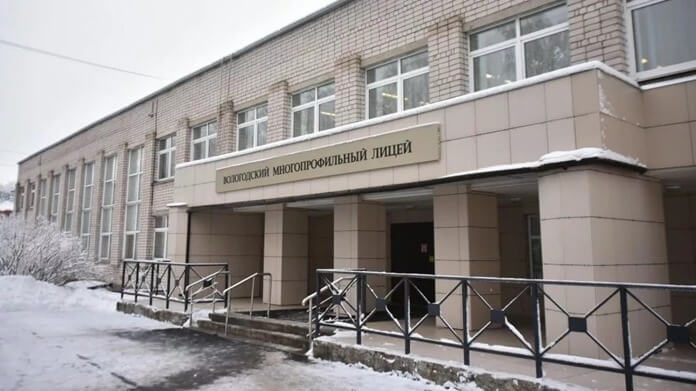 A rare "northern bird" among Muscovites, the Vologda Lyceum was originally created with the expectation of working with gifted and talented children. And how to separate a gifted person from a mere mortal? That's right, by arranging exams.
A rare "northern bird" among Muscovites, the Vologda Lyceum was originally created with the expectation of working with gifted and talented children. And how to separate a gifted person from a mere mortal? That's right, by arranging exams.
To get at least a chance for an elite education, a child should be prepared with tutors or sent to a preparatory, paid school at the lyceum. And then there is a selection, comparable in its rigidity with admission to astronauts.
But the graduates of the lyceum more than once took the bar of 100 points on the exam, won many Olympiads (they completed the regional one with a maximum score of more than 500 people) and entered the leading universities of the country.
8. School number 2007, Moscow
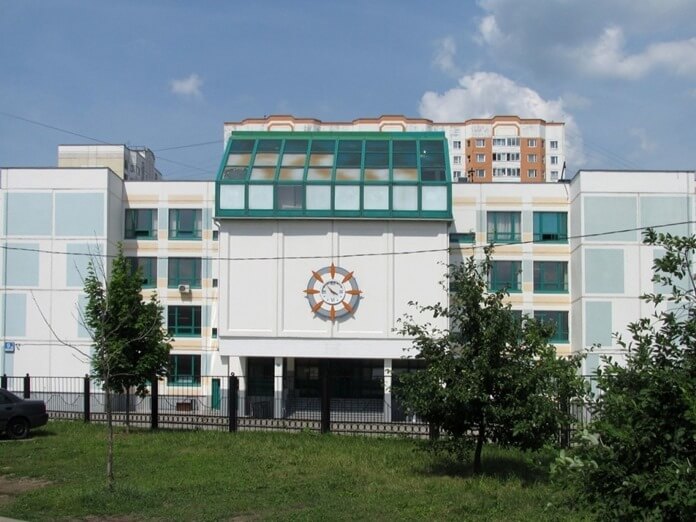 Since its inception, this educational institution has focused on an elite education, and getting there was not easy. To enter the holy of holies of physics and mathematics education, a child must not only pass exams, but also provide diplomas of the winner (or at least a prize-winner) of the Olympiads.
Since its inception, this educational institution has focused on an elite education, and getting there was not easy. To enter the holy of holies of physics and mathematics education, a child must not only pass exams, but also provide diplomas of the winner (or at least a prize-winner) of the Olympiads.
But after admission, it will not be possible to relax - as the teachers themselves and former students say, all the time (both academic and free) will be devoted to mathematics and / or physics. Hobby? We'll have to forget about him. Weekends? That's what mugs are for. School break? The mathematics school in Crimea is waiting for your child with open arms. On the other hand, the results of the exam at school No. 2007 are among the best in Moscow (and in 2018 they were the highest).
7. Phystech Lyceum. Kapitsa, Dolgoprudny
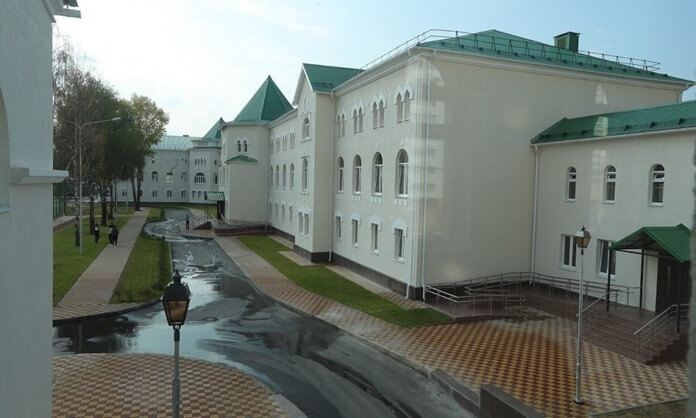 The seventh place in the rating of the best Russian schools is located in the city of Dolgoprudny near Moscow. In this Physics and Technology Lyceum, the natural direction prevails - physics, chemistry, biology, mathematics. In recent years, fashionable programming has also been added.
The seventh place in the rating of the best Russian schools is located in the city of Dolgoprudny near Moscow. In this Physics and Technology Lyceum, the natural direction prevails - physics, chemistry, biology, mathematics. In recent years, fashionable programming has also been added.
Children from the street will not get here - they need to be specially prepared for the requirements of the school. And in 2019, the chances of the "simple" for an elite education fell even lower. It was announced that the school would change its public status to private and become an autonomous non-profit organization. In honor of which, parents began to charge a tuition fee of 10 thousand rubles a month.
6. Presidential Physics and Mathematics Lyceum No. 239, St. Petersburg
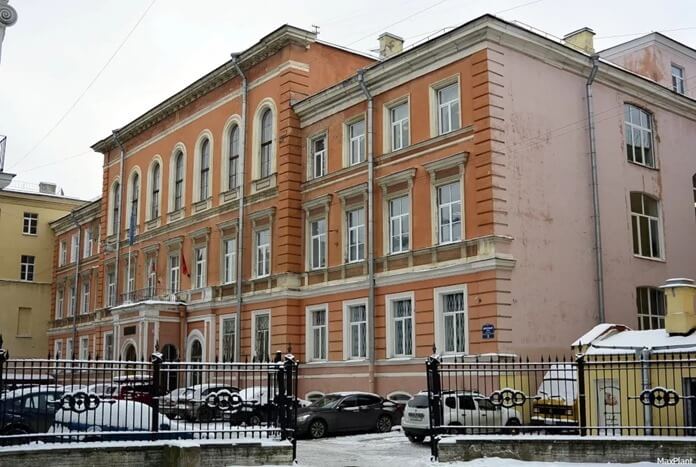 In terms of the number of elite schools, the capital of Russia is followed by the northern capital (9 schools in St. Petersburg against 50 schools in Moscow). And one of them is school number 239, but not simple, but with traditions. She recently celebrated her centenary.
In terms of the number of elite schools, the capital of Russia is followed by the northern capital (9 schools in St. Petersburg against 50 schools in Moscow). And one of them is school number 239, but not simple, but with traditions. She recently celebrated her centenary.
Since the beginning of the 60s of the last century, the Lyceum began to specialize in the physics and mathematics direction, and so successfully that since then it has been consistently among the top schools in Russia. From 2015 to 2019, he generally ranked first. And the number of Olympiad winners in this educational institution is measured in hundreds.
As parents say, the reason for the success of the school is in the strict selection of the most talented children, from whom the “random” children are then methodically screened out for the best results in reporting. High competition, strict requirements, exhausting loads lead to a high degree of stress in children. But knowledge requires sacrifice.
5. Republican Lyceum for Gifted Children, Saransk
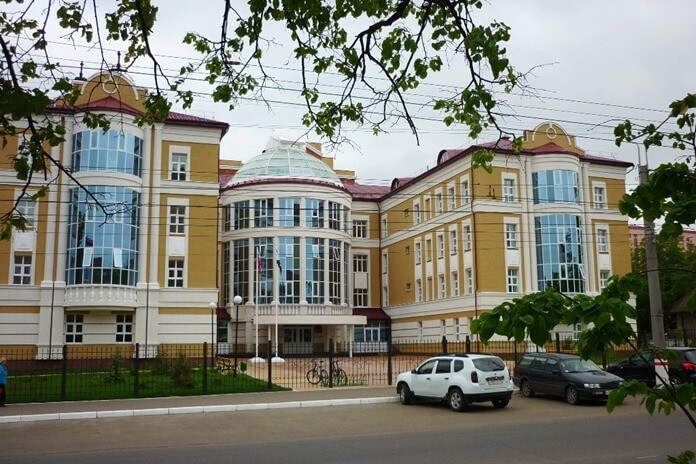 Among the old-time schools, the Saransk Lyceum is a beginner (he is only 9 years old). However, over the years, students have earned 20 Olympic medals, and not regional, but international. For several years in a row, the Lyceum has been among the top ten most prestigious schools throughout Russia.
Among the old-time schools, the Saransk Lyceum is a beginner (he is only 9 years old). However, over the years, students have earned 20 Olympic medals, and not regional, but international. For several years in a row, the Lyceum has been among the top ten most prestigious schools throughout Russia.
The director of the school claims that the purpose of its creation was to give talented Mordovian children a start in life, to provide starting conditions for young minds, especially those inclined to natural and exact sciences. And the republican authorities can both pay extra to the teachers who have trained the medalists-olympiads, and provide cash prizes to the children themselves.
True, Moscow is not asleep - it is already luring talented Olympiad winners by promising them a “salary” ten times higher (300,000 rubles for winning the All-Russian Olympiad against 30,000 rubles that the republic can pay). Several children have already “changed their registration” in this way. We will find out in a few years how the battle of wallets will end for the opportunity to attach a victorious Olympiad star to the school's flag.
4. University gymnasium of Moscow State University, Moscow
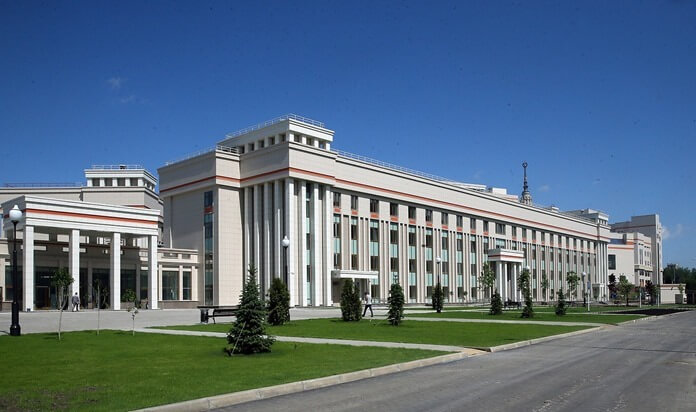 This educational institution was opened just four years ago, in 2016.“Gymnasium of Moscow State University” is not an empty phrase; classes at the school are taught by teachers directly from the University. Gifted schoolchildren from all over Russia are recruited there in grades 8-11. To become one of the chosen 350, schoolchildren will have to pass entrance exams in several stages.
This educational institution was opened just four years ago, in 2016.“Gymnasium of Moscow State University” is not an empty phrase; classes at the school are taught by teachers directly from the University. Gifted schoolchildren from all over Russia are recruited there in grades 8-11. To become one of the chosen 350, schoolchildren will have to pass entrance exams in several stages.
But then everything around will contribute to the awakening of their creative thought - from teaching according to a special plan that combines the traditional lesson system with non-linear (whatever that means) classes and ending with original premises.
According to the founders of the educational institution, the original design of the institution should inspire students to original thinking. And apparently, it is so, because the school is considered one of the best in Russia in terms of the number of Olympiad winners and graduates.
3. Physics and Mathematics Lyceum №31, Chelyabinsk
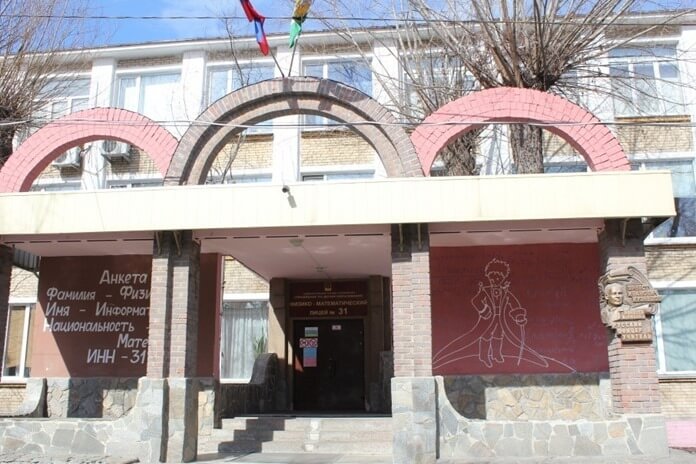 Siberians in the number of the best schools in Russia in terms of the competitiveness of graduates are not much behind Tatarstan. While there are five such schools in Kazan and the region, there are four in the Novosibirsk and Chelyabinsk regions. One of them is a lyceum in Chelyabinsk.
Siberians in the number of the best schools in Russia in terms of the competitiveness of graduates are not much behind Tatarstan. While there are five such schools in Kazan and the region, there are four in the Novosibirsk and Chelyabinsk regions. One of them is a lyceum in Chelyabinsk.
As the director says, the reason for the success of the institution entrusted to his care is the high quality of teaching, a well-coordinated team and the continuation of the traditions of Soviet education.
As usual, to continue the traditions of an elite school requires the appropriate level of students. Therefore, they are recruited to school through exams starting from grade 5. To get into the number of the elite, the child will have to make serious efforts: go to courses, study with tutors and pass the screenings of tough entrance exams. And then study. But for those who have passed the school, there is a real chance to enter out of competition based on the results of the Olympiads won.
2. Lyceum "Second School", Moscow
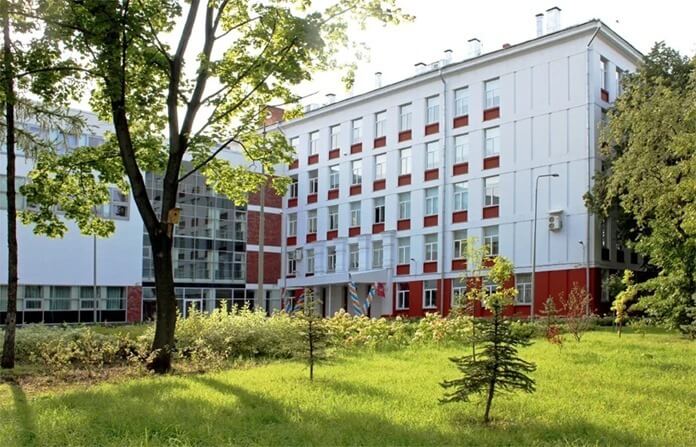 Like many other top schools in Russia in 2020, the lyceum has a long and glorious history in physics and mathematics, to which chemistry, biology and the humanities were later added.
Like many other top schools in Russia in 2020, the lyceum has a long and glorious history in physics and mathematics, to which chemistry, biology and the humanities were later added.
Lyceum enrollment is from 6th to 8th grade, according to the results of exams. In addition to the day school, the main one, there is also an evening school (something like an expanded system of circles), where children from grades 2 to 7 are engaged.
In terms of the number of Olympiad winners and those who scored 100 points in the Unified State Exam, the Second School is among the best in Moscow and the region. Her program has nothing to do with the school - everything is her own, according to her own materials. The workload on the students is great, they have to study at least six out of seven days a week. At the same time, a four is considered a very good mark, and in order to get a five, it is necessary to study according to an extended program.
1. SUNC MSU, Moscow
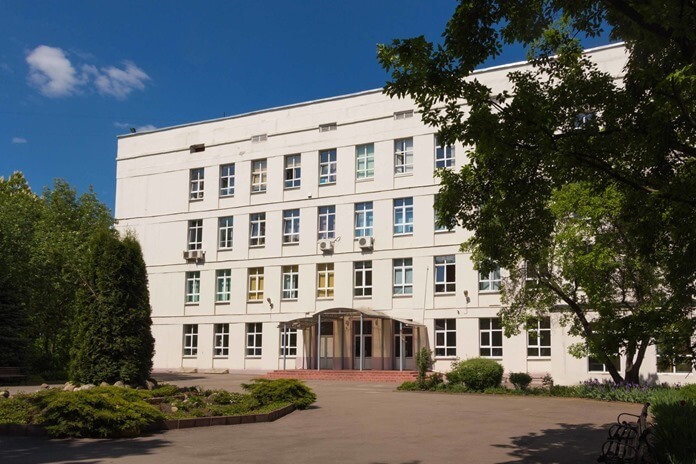 SUNC is one of four schools founded in the 60s of last year by a special resolution of the Council of Ministers of the USSR with the aim of replenishing the physical and mathematical personnel for the country. Academician Kolmogorov, who stood at its origins, saw the awakening of the creative spirit in talented youth as his main and main task.
SUNC is one of four schools founded in the 60s of last year by a special resolution of the Council of Ministers of the USSR with the aim of replenishing the physical and mathematical personnel for the country. Academician Kolmogorov, who stood at its origins, saw the awakening of the creative spirit in talented youth as his main and main task.
It's hard to say anything definite about this most elusive creative spirit, but at the moment SUNC is one of the strongest schools in Russia in terms of the level of training of its students. They are selected there, of course, on a competitive basis, in two rounds. Moreover, it is argued that connections do not play any role. The main selection criterion is the level of knowledge of the child.
Even at the most competitive school in Russia, there is a special version of it, summer. It is a cross between exams and trial learning so that the child and parents can understand if they need it at all. Based on the results of the training, the child is awarded points, and the higher their number, the more chances it is to get into the country's academic elite.

